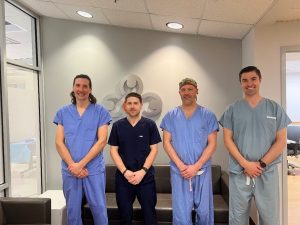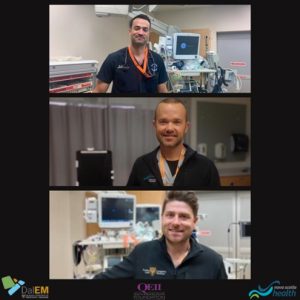
Congratulations to this year’s EMYRG recipients: Adam Parks, Ryan Fitzpatrick, and James Gould. All studies are currently underway.
Applications for the EMYRG grant are open now, with a deadline of June 6, 2024,
Please email Melissa MacDougall melissa.macdougall@dal.ca for the application form.
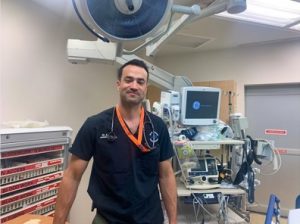
Adam Parks: A two-time recipient of the EMYRG grant, Adam has been awarded for an upcoming study titled, Differences in force used by medical trainees during laryngoscopy: a comparative study of manikin versus cadaver in medical training, collaborating with a research volunteer (EMReV). The study is being conducted to compare the amount of force applied by medical students during airway management of manikins and cadavers. The goal of the study is to demonstrate that airway manikins require significantly more force compared to cadavers. This may result in changes to the design of manikins and how we train medical students in airway management.
Adam was recently featured in the QEII Times for their previous research study, Accuracy of bougie use and tracheal clicks during simulated, stressful scenarios: A cadaveric study. This study aimed to provide evidence on how medical providers perform with bougies during stressful scenarios and may help inform airway guidelines. Adam presented the preliminary findings at the EMS Research Day in October.
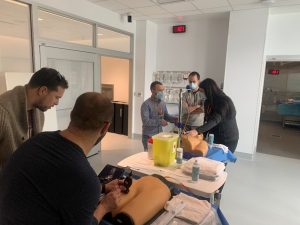
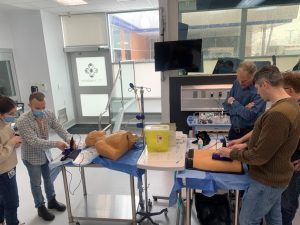 Ryan Fitzpatrick’s prospective study, Paramedics providing POCUS for difficult intravenous access in the emergency department, aims to assess the success rates of intravenous cannulation with the help of a paramedic team. When Ryan applied for the grant, the study was in phase 1, observing intravenous cannulation from the paramedics in the emergency department. The study is currently in its second phase, which involves collecting data for the next nine months. In this phase, 16 advanced care and critical care paramedics were trained on point-of-care ultrasound using the Butterfly iQ+ in January.
Ryan Fitzpatrick’s prospective study, Paramedics providing POCUS for difficult intravenous access in the emergency department, aims to assess the success rates of intravenous cannulation with the help of a paramedic team. When Ryan applied for the grant, the study was in phase 1, observing intravenous cannulation from the paramedics in the emergency department. The study is currently in its second phase, which involves collecting data for the next nine months. In this phase, 16 advanced care and critical care paramedics were trained on point-of-care ultrasound using the Butterfly iQ+ in January.
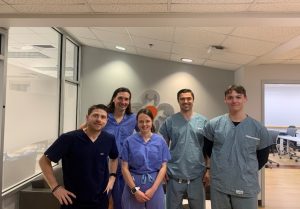 James Gould’s study, Examining the effects of left sternal border chest compressions on compression dynamics and thoracoabdominal organs using clinical grade cadavers featured in the Fall Research Focus, completed its data collection on April 4, 2024. The study was made possible by the collaborative efforts of a multidisciplinary team from Dalhousie University, which includes Dr. James Gould and Dr. Daniel French, and the University of Saskatchewan, led by Dr. Paul Olszynski and Ph.D. candidate Rory Marshall. Radiological Technologists Shawna Mullin-Salo and Chandran Spicer from Nova Scotia Health and research volunteers Natalie Berry and Liam Patrick Hagerman from Dalhousie also played an essential role in the study.
James Gould’s study, Examining the effects of left sternal border chest compressions on compression dynamics and thoracoabdominal organs using clinical grade cadavers featured in the Fall Research Focus, completed its data collection on April 4, 2024. The study was made possible by the collaborative efforts of a multidisciplinary team from Dalhousie University, which includes Dr. James Gould and Dr. Daniel French, and the University of Saskatchewan, led by Dr. Paul Olszynski and Ph.D. candidate Rory Marshall. Radiological Technologists Shawna Mullin-Salo and Chandran Spicer from Nova Scotia Health and research volunteers Natalie Berry and Liam Patrick Hagerman from Dalhousie also played an essential role in the study.
This study compared the effects of performing compressions on the middle of the chest versus the left of center, specifically looking at chest wall response and potential injuries in the chest and abdomen.
(pictured left to right: James Gould, Paul Olszynski, Natalie Berry, Rory Marshall)
We can’t wait to see the results!
